HREOC Report No. 17: Appendices
Report of an inquiry into
a complaint by the Asylum Seekers Centre concerning changes to the Asylum
Seekers Assistance Scheme
HREOC Report No. 17
Appendices
APPENDIX
B
Case
studies provided by the centre in letter of 23 May 1997APPENDIX
C
Case studies provided by the arc in letter of April 1998APPENDIX
D
Case studies provided by the centre in letter of 11 March 1998APPENDIX
E
Summary of statistical material contained in preliminary reportAPPENDIX
F
A: Relevant provisions of the convention on the rights of the child
45B:
Relevant provisions of the international covenant on civil and political
rights
C: Relevant provisions of the international covenant on economic, social
and cultural rights
D: Relevant provisions of the 1951 convention relating to the status
of refugees
Please note: If you require
the tables included in this document in a more accessible format please
email:webfeedback@humanrights.gov.au
APPENDIX A
Functions of the
Human Rights and Equal Opportunity Commission in relation to human rights
The Commission has specific legislative functions and responsibilities
for the protection and promotion of human rights under the HREOC Act.
Part II Divisions 2 and 3 of the HREOC Act confer functions on the Commission
in relation to human rights. In particular, s.11(1)(f) of the HREOC Act
empowers the Commission to inquire into acts or practices of the Commonwealth
that may be inconsistent with or contrary to the rights set out in the
human rights instruments scheduled to or declared under the HREOC Act.
Section 11(1)(f)
of the HREOC Act states:
(1) The functions
of the Commission are:
(f) to inquire into
any act or practice that may be inconsistent with or contrary to any human
right, and:
(i) where the Commission
considers it appropriate to do so?to endeavour, by conciliation, to
effect a settlement of the matters that gave rise to the inquiry; and
(ii) where the Commission is of the opinion that the act or practice
is inconsistent with or contrary to any human right, and the Commission
has not considered it appropriate to endeavour to effect a settlement
of the matters that gave rise to the inquiry or has endeavoured without
success to effect such a settlement?to report to the Minister in relation
to the inquiry.
Section 3 of the
HREOC Act defines an "act" or "practice" as including
an act or practice done by or on behalf of the Commonwealth or an authority
of the Commonwealth.
The Commission performs
the functions referred to in s.11(1)(f) of the HREOC Act upon the Attorney?General's
request, when a complaint is made in writing or when the Commission regards
it desirable to do so (s.20(1) of the HREOC Act).
In addition, the
Commission is obliged to perform all of its functions in accordance with
the principles set out in s.l0A of the HREOC Act, namely with regard for
the indivisibility and universality of human rights and the principle
that every person is free and equal in dignity and rights.
The Commission attempts
to resolve complaints under the provisions of the HREOC Act through the
process of conciliation. Where conciliation is not successful or not appropriate
and the Commission is of the opinion that an act or practice constitutes
a breach of human rights, the Commission shall not furnish a report to
the Attorney?General until it has given the respondent to the complaint
an opportunity to make written or oral submissions in relation to the
complaint (s.27 of the HREOC Act).
If, after the inquiry,
the Commission finds a breach of human rights, it must serve a notice
on the person doing the act or engaging in the practice setting out the
findings and the reasons for those findings (s.29(2)(a) of the HREOC Act).
The Commission may make recommendations for preventing a repetition of
the act or a continuation of the practice, the payment of compensation
or any other action to remedy or reduce the loss or damage suffered as
a result of the breach of a person's human rights (s. 29(2)(b) and (c)
of the HREOC Act).
If the Commission
finds a breach of human rights and it furnishes a report on the matter
to the Attorney?General, the Commission is to include in the report particulars
of any recommendations made in the notice (s.29(2)(d)) of the HREOC Act)
and details of any actions that the person is taking as a result of the
findings and recommendations of the Commission (s.29(2)(e) of the HREOC
Act). The Attorney-General must table the report in both Houses of Federal
Parliament within 15 sitting days in accordance with s.46 of the HREOC
Act.
It should be noted
that the Commission has a discretion to cease inquiry into an act or practice
in certain circumstances (s.20(2) of the HREOC Act), including where the
subject matter of the complaint has already been adequately dealt with
by the Commission (s.20(2)(c)(v) of the HREOC Act).
APPENDIX B
Case studies provided
by the centre in letter of 23 May 1997
Case Study 1
"A couple with
a newborn child had been receiving ASA benefits. They had already been
interviewed by a member of the RRT when benefits were cut off on 1 October
1996. In early 1997, the RRT recognised the refugee claims of the family
and overturned the decision made by DIMA. It was another month before
health and police checks were completed and the family gained permanent
residence and thus access to some government support. In the six months
that the family had to survive without any government assistance, the
father worked long hours at low pay, to help support his wife and child.
Even with this income, the parents had to do without basic necessities
in order to adequately care for their baby. The physical and mental health
of the parents deteriorated visibly over the months of waiting, particularly
that of the father, putting great stress on the family. The father would
not take time off work even for urgent medical treatment because he feared
losing his casual job."
Case Study 2
"A man from
a country notorious for fierce civil war and human rights abuses arrived
in Australia in March 1997. Despite his good command of the English language
and a professional background, it took him two weeks to find out how to
access legal assistance and lodge his application for a protection visa.
Since his arrival in Australia he has been living in emergency accommodation
for homeless men. He quickly used up most of the money he brought with
him paying to stay in one homeless shelter. He was subsequently able to
stay in another homeless shelter on the condition that he contribute to
expenses when he could. Still in that shelter, he has a roof over his
head and food each day, but this inappropriate form of accommodation is
exacerbating stress related problems that he has been experiencing. He
is currently receiving weekly counselling at STARTTS (Service for the
Treatment and Rehabilitation of Torture and Trauma Survivors). DIMA recently
rejected his application without waiting for material that they knew was
being sent to support the claims made on the application form. Even without
the supporting material, the claims on the form called for greater examination
of the case than the DIMA case officer gave it. The client, who according
to legal advisers with much experience in refugee matters, has strong
refugee claims, must now survive while waiting for the RRT to decide his
case. Now that his original visa has expired and he has lodged a protection
visa application, he has a bridging visa with permission to work, but
he has not yet found employment."
APPENDIX C
Case studies provided
by the ARC in letter of April 1998
Case Study 3
"A single mother
with five children under the age of 13 was deemed ineligible for further
assistance through ASAS on 1 October, 1996 because her case was before
the Refugee Review Tribunal (RRT). This family had been dependant on ASAS
for 18 months. Following the withdrawal of assistance, the mother found
casual employment. To do so, she withdrew her oldest child (age 12) from
school, that lie might look after the younger children, including a baby.
This situation was brought to the attention of the NSW Department of Community
Services and the mother was forced to give up her job, return her son
to school and tend for the children. The family then became dependant
on handouts from various charitable organisations."
Case Study 4
"A single mother
with three children (aged 4, 7 and 11) plus her mother and brother (aged
16), were determined to be ineligible for ASAS on 1 October 1996 because
their case was before the RRT. Their case was subsequently approved by
the RRT in late 1996 and their Protection Visas issued in January, 1997.
Between the date of their final ASAS payment (18 September, 1996) and
the issuance of their Protection Visas, this family was supported in part
by donations from charitable organisations. Their rent however, was in
part paid for by way of enforced sexual favours sought from the principal
applicant."
Case Study 5
"Eight year
old child with her parents who have applied for protection visa. Primary
decision has been made, and the family is waiting for a decision on an
RRT appeal. The child's parents have been unable to find work, and are
not eligible for income support from ASAS or Social Security. The child
has kidney problems and the mother has not had treatment for her gastric
problems and anaemia due to inadequate finances. Community and family
sources of assistance with accommodation and private financial resources
have been exhausted, so that the family faces the probability of homelessness.
If this occurs, they may be fortunate enough to be able to live in one
room of someone else's house with loss of privacy and the strain on the
host family that would accompany this."
Case Study 6
"Family consisting
of grandparents, parents and children, with two PV applications before
the RRT. The parents have permission to work but have been unable to secure
employment. The grandparents do not have permission to work, are ineligible
for Medicare and therefore also ineligible for the Prescription Benefit
Scheme (PBS). The family is presently being supported by the St. Vincent
de Paul Society and the Australian Red Cross who provide $160.00 per month
for prescription medications required by the grandparents, who both have
failing health. This family is a significant drain on the resources of
three charitable organisations (past nine months) and will remain so until
their case is finalised."
Case Study 7
"Single male
who arrived in Australia with false documentation. He had no permission
to work (due to the 45 day rule) and was not eligible for ASAS as his
case has not been before the Department for six months. This man slept
on the floor of the house of an acquaintance, and was required to leave
the house each morning and return at night. He was not fed by the occupants
of the house. Australian Red Cross provided the man with $30.00 per week
for food and personal expenses. He did not meet the amended guidelines
of the 1995/96 ASAS Agreement for an exemption to the eligibility criteria
as there was no 'unforeseen change in circumstances' since his arrival
in Australia. He is currently seeking a review of the primary decision."
Case Study 8
"Family consisting,
of husband, wife and four year old child, came to the attention of the
Red Cross in July 1997. They had exhausted those funds which they had
brought into Australia and were without accommodation. At the time of
Red Cross intervention they were preparing to sleep on the street. They
were referred to the NSW Department of Housing where provision was made
for firstly, five nights emergency accommodation and then six months accommodation
under the Temporary Emergency Accommodation provision. The family would
not have qualified for an exemption to the six-month waiting criteria
as they had not had an unforeseen change of circumstance since their arrival
in Australia. This family received emergency assistance from Red Cross
($50.00 per week for food, utilities and rent for the NSW Department of
Housing which was $5.00 per week). They also received assistance from;
Foodbank, International Teams and the St.Vincent de Paul Society."
Case Study 9
"Single male,
whose primary decision was made within six months and is now seeking a
review of the decision at the RRT. He has no permission to work (lodged
Protection Visa application after 45 days) and is therefore ineligible
for Medicare. He is a resident at an inner city men's refuge where he
is unable to pay for his board. He receives $30.00 per week from the Red
Cross for personal items and medication for his ongoing medical condition
(asthma). The RRT has not been asked to expedite this case as the applicant
is not considered to be in the highest risk category. He will continue
to be dependant on charitable welfare until his case is finalised."
APPENDIX D
Case studies provided
by the centre in letter of 11 March 1998
Case Study 10
"A young woman
arrived in Australia with her husband and two small children. She had
fled from her homeland, a country in which a long running civil war has
caused much death and displacement and continues to do so. The family
arrived in August 1996 and lodged an application for a protection visa
in the same month. The needs of this family were so obvious and extensive
that the family was exempted from the six month waiting period for assistance
under the ASA scheme while their case was with DIMA. The application was
rejected by DIMA in early 1997, and the family then appealed to the RRT.
Once DIMA rejected the case, ASAS benefits ceased, because by then assistance
under the ASA scheme was no longer available for asylum seekers with cases
at the RRT. Even while the family was receiving ASA benefits, they required
assistance from non-government agencies. Once ASA benefits stopped, the
assistance required went well beyond what charitable agencies could provide.
In particular, the wife and children have had ongoing needs that agencies
have not been able to adequately meet, even though more than ten different
agencies have been assisting in different ways: rent assistance, food
assistance, legal assistance, health care, trauma counselling, child care
and assistance with paying bills. Due to lack of resources, some agencies
have had to bring to an end even the limited assistance they have been
able to give. This case was still not finalised in early 1998."
Case Study 11
"A family of
four mother, father and two children of primary school age arrived in
Australia in early 1997. They had fled from a country suffering a decades
long civil conflict that has produced massive numbers of refugees. The
family lodged a refugee application in April 1997. Because they arrived
with false papers, the bridging visas that the parents were given did
not initially include permission to work. They applied to DIMA for permission
to work, but DIMA did not grant such permission until July 1997. From
the time of arrival, the family required substantial assistance with accommodation,
food and medical care. As their case was still undecided by DIMA after
six months, they became eligible for assistance under the ASA scheme in
late 1997 and received such assistance until DIMA rejected their protection
visa application, at which point they lodged an appeal to the RRT. Even
while they received ASAS benefits, they required help from charitable
organisations. The amount of assistance required before they became eligible
for assistance under the ASA scheme and once they stopped receiving ASAS
benefits was very substantial. This family has received ongoing assistance
from several charitable agencies as well as an ethnic community group
to supplement income from some limited casual employment. They have been
unable to survive without such assistance, but it is uncertain how long
agencies will be able to help."
Case Study 12
"A family group
consisting of a husband and wife, their young child and the man's elderly
mother and father arrived in Australia in March 1997. They had fled a
country racked by civil war. The wife was several months pregnant when
they arrived and required medical care before, during and after the birth
of the couple's child. The husband's mother suffers from a chronic illness
and has required ongoing medical care as has the husband's father. The
husband himself required medical assistance for stress related problems.
The family has also had substantial needs with respect to food, housing
and basic living expenses. The family lodged a refugee application in
June 1997. They also lodged applications for permission to work. After
much advocacy from concerned agencies, the husband and wife were granted
permission to work, but the husband's parents were not, and therefore
have not been eligible for Medicare. DIMA rejected the protection visa
application in late 1997, and the family lodged an appeal to the RRT.
Recently, the RRT overturned DIMA's rejection of this case. At no stage
did this refugee family qualify for assistance under the current ASA scheme.
Clearly they would have been eligible under the scheme operating prior
to October 1996. One charitable agency managed to organise essential surgery
for the husband's mother as well as health care assistance for various
members of the family. Other agencies have been helping with accommodation,
food and other essentials. As with other cases, assisting this family
has put great strain on the stretched resources of charitable agencies.
Such agencies have been able to help, but not adequately.
As a result, the
stresses and strains of trying to survive have taken their toll on family
members."
APPENDIX E
Summary of statistical
material contained in preliminary report at TABLE 1
Recipients of ASA
benefits July 1996 to October 1997
Month "Cases" receiving ASA "Cases" receiving ASA
based on exemption from 6 month waiting period (% of total cases) Total
"PV applicants" receiving ASA PV applicants under 18 receiving
assistance (% of total applicants)
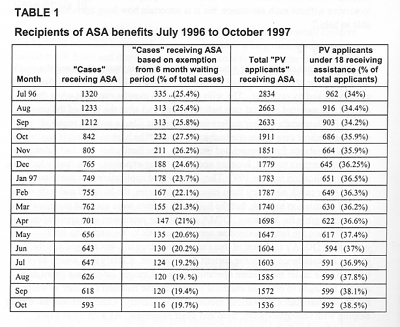
TABLE 2
Lodgement and determination of protection visa applications October 1995
to September 1997
Month PVapplicationslodged Total PVapplicationsdetermined PV applicationsgranted(%
of total) PVapplicationsrejected Averageprocessingtime (days)
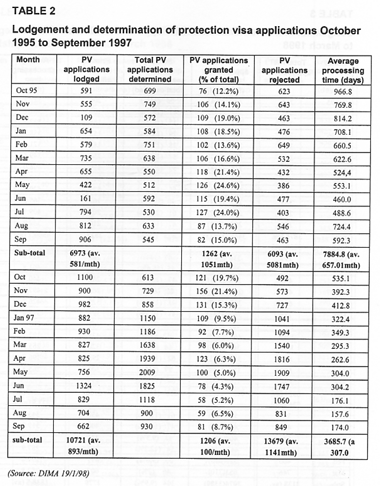
TABLE 3
Lodgement and determination of RRT applications October 1995
to March 1998
Month Total RRTapplicationsreceived Total RRTapplicationsdecided (finalised)
Primary decisionset aside (% oftotal decided) Primarydecisionaffirmed
Averageprocessing time (days)
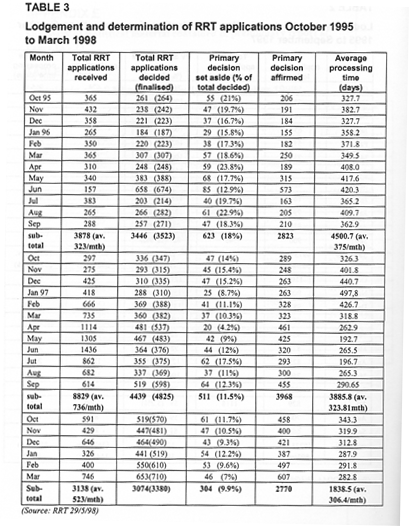
TABLE 4
Lodgement and determination of RRT applications demonstrating hardship
- October 1995 to March 1998
Month Total RRTapplicationsreceived Hardship casesreceived (% oftotal
RRTapplications) Totalhardshipcasesdecided(finalised) Primarydecision
setaside (% of total hardship cases) Primarydecisionaffirmed Averageprocessingtime(days)
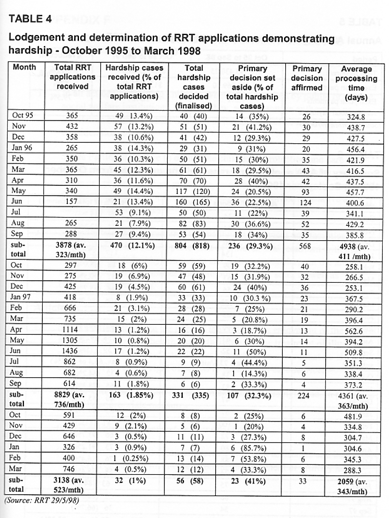
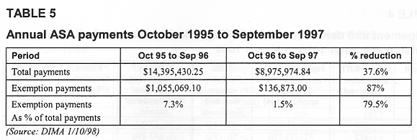
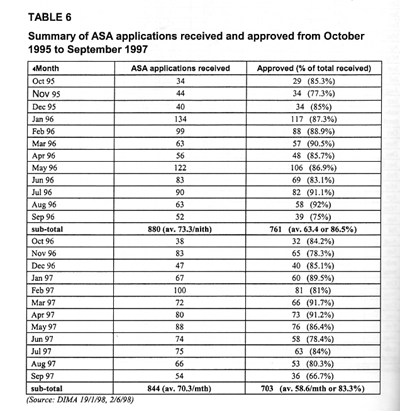
APPENDIX F
A: RELEVANT PROVISIONS
OF THE CONVENTION ON THE RIGHTS OF THE CHILD
Article 3
1. In all actions
concerning children, whether undertaken by public or private social welfare
institutions, courts of law, administrative authorities or legislative
bodies, the best interests of the child shall be a primary consideration.
2. States Parties
undertake to ensure the child such protection and care as is necessary
for his or her well-being, taking into account the rights and duties of
his or her parents, legal guardians, or other individuals legally responsible
for him or her, and, to this end, shall take all appropriate legislative
and administrative measures.
3. States Parties
shall ensure that the institutions, services and facilities responsible
for the care or protection of children shall conform with the standards
established by competent authorities, particularly in the areas of safety,
health, in the number and suitability of their staff, as well as competent
supervision.
Article 24
1. States Parties
recognize the right of the child to the enjoyment of the highest attainable
standard of health and to facilities for the treatment of illness and
rehabilitation of health. States Parties shall strive to ensure that no
child is deprived of his or her right of access to such health care services.
2. States Parties
shall pursue full implementation of this right and, in particular, shall
take appropriate measures:
(a) To diminish
infant and child mortality;
(b) To ensure the provision of necessary medical assistance and health
care to all children with emphasis on the development of primary health
care;
(c) To combat
disease and malnutrition, including within the framework of primary
health care, through, inter alia, the application of readily available
technology and through the provision of adequate nutritious foods and
clean drinking-water, taking into consideration the dangers and risks
of environmental pollution;
(d) To ensure appropriate pre-natal and post-natal health care for mothers;
(e) To ensure that all segments of society, in particular parents and
children, are informed, have access to education and are supported in
the use of basic knowledge of child health and nutrition, the advantages
of breastfeeding, hygiene and environmental sanitation and the prevention
of accidents; and
(f) To develop preventive health care, guidance for parents and family
planning education and services.
3. States Parties
shall take all effective and appropriate measures with a view to abolishing
traditional practices prejudicial to the health of children.
4. States Parties
undertake to promote and encourage international co-operation with a view
to achieving progressively the full realization of the right recognized
in the present article. In this regard, particular account shall be taken
of the needs of developing countries."
B: RELEVANT PROVISIONS
OF THE INTERNATIONAL COVENANT ON CIVIL AND POLITICAL RIGHTS
Article 26
All persons are equal
before the law and are entitled without any discrimination to the equal
protection of the law. In this respect, the law shall prohibit any discrimination
and guarantee to all persons equal and effective protection against discrimination
on any ground such as race, colour, sex, language, religion, political
or other opinion, national or social origin, property, birth or other
status.
C: RELEVANT PROVISIONS
OF THE INTERNATIONAL COVENANT ON ECONOMIC, SOCIAL AND CULTURAL RIGHTS
Article 9
The States Parties
to the present Covenant recognize the right of everyone to social security,
including social insurance.
Article 11
1. States Parties
to the present Covenant recognize the right of everyone to an adequate
standard of living for himself and his family, including adequate food,
clothing and housing, and to the continuous improvement of living conditions.
The States Parties will take appropriate steps to ensure the realization
of this right, recognizing to this effect the essential importance of
international co-operation based on free consent.
2. The States Parties
to the present Covenant, recognizing the fundamental right of everyone
to be free from hunger, shall take, individually and through international
co-operation, the measures, including specific programmes, which are needed:
(a) To improve
methods of production, conservation and distribution of food by making
full use of technical and scientific knowledge, by disseminating knowledge
of the principles of nutrition and by developing or reforming agrarian
systems in such a way as to achieve the most efficient development and
utilization of natural resources; and
(b) Taking into account the problems of both food-importing and food-exporting
countries, to ensure an equitable distribution of world food supplies
in relation to need.
Article 12
1. States Parties
to the present Covenant recognize the right of everyone to the enjoyment
of the highest attainable standard of physical and mental health.
2. The steps to be
taken by the States Parties to the present Covenant to achieve the full
realization of this right shall include those necessary for:
(a) The provision
for the reduction of the stillbirth-rate and of infant mortality and
for the healthy development of the child;
(b) The improvement of all aspects of environmental and industrial hygiene;
(c) The prevention, treatment and control of epidemic, endemic, occupational
and other diseases;
(d) The creation of conditions which would assure to all medical service
and medical attention in the event of sickness.
D: RELEVANT PROVISIONS
OF THE 1951 CONVENTION RELATING TO THE STATUS OF REFUGEES
Article 21
As regards housing,
the Contracting States, in so far as the matter is regulated by laws or
regulations or is subject to the control of public authorities, shall
accord to refugees lawfully staying in their territory treatment as favourable
as possible and, in any event, not less favourable than that accorded
to aliens generally in the same circumstances.
Article 23
The Contracting States
shall accord to refugees lawfully staying in their territory the same
treatment with respect to public relief and assistance as is accorded
to their nationals.
Article 24
1. The Contracting
States shall accord to refugees lawfully staying in their territory the
same treatment as is accorded to nationals in respect of the following
matters;
(a) In so far as
such matters are governed by laws or regulations or are subject to the
control of administrative authorities: remuneration, including family
allowances where these form part of remuneration, hours of work, overtime
arrangements, holidays with pay, restrictions on home work, minimum
age of employment, apprenticeship and training, women's work and the
work of young persons, and the enjoyment of the benefits of collective
bargaining;
(b) Social security (legal provisions in respect of employment injury,
occupational diseases, maternity, sickness, disability, old age, death,
unemployment, family responsibilities and any other contingency which,
according to national laws or regulations, is covered by a social security
scheme), subject to the following limitations:(i) There may
be appropriate arrangements for the maintenance of acquired rights
and rights in course of acquisition;
(ii) National laws or regulations of the country of residence may
prescribe special arrangements concerning benefits or portions of
benefits which are payable wholly out of public funds, and concerning
allowances paid to persons who do not fulfill the contribution conditions
prescribed for the award of a
normal pension.
2. The right to compensation
for the death of a refugee resulting from employment injury or from occupational
disease shall not be affected by the fact that the residence of the beneficiary
is outside the territory of the Contracting State.
3. The Contracting
States shall extend to refugees the benefits of agreements concluded between
them, or which may be concluded between them in the future, concerning
the maintenance of acquired rights and rights in the process of acquisition
in regard to social security, subject only to the conditions which apply
to nationals of the States signatory to the agreements in question.
4. The Contracting
States will give sympathetic consideration to extending to refugees so
far as possible the benefits of similar agreements which may at any time
be in force between such Contracting States and non- contracting States.
Please note: If you require
the tables included in this document in a more accessible format please
email:webfeedback@humanrights.gov.au
Last
updated 27 June 2002.
